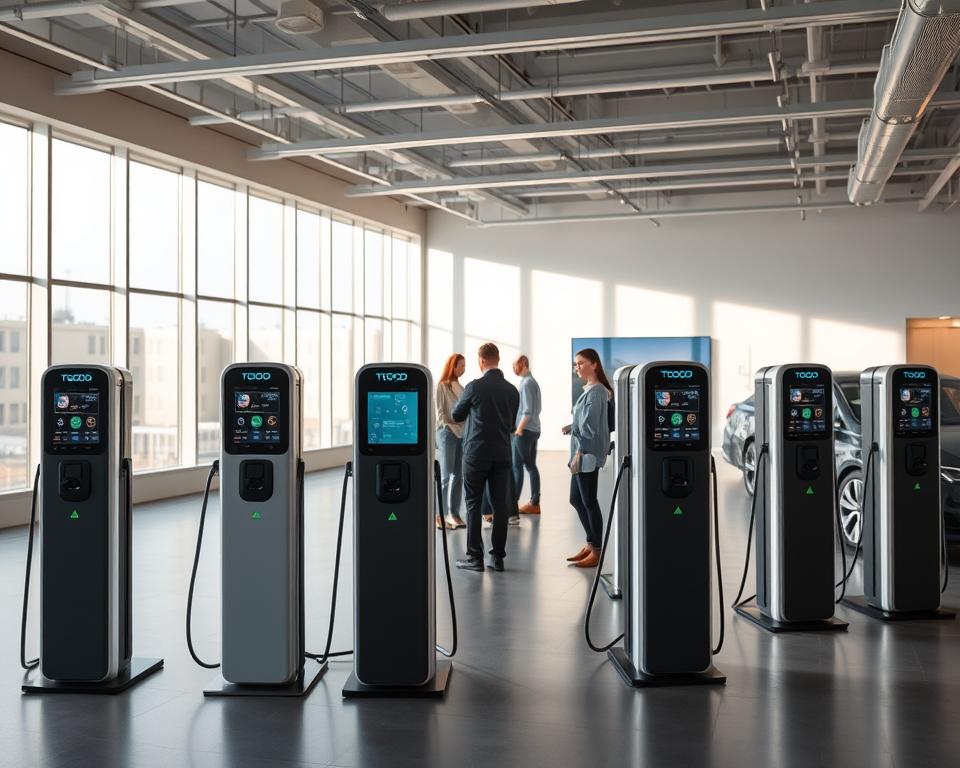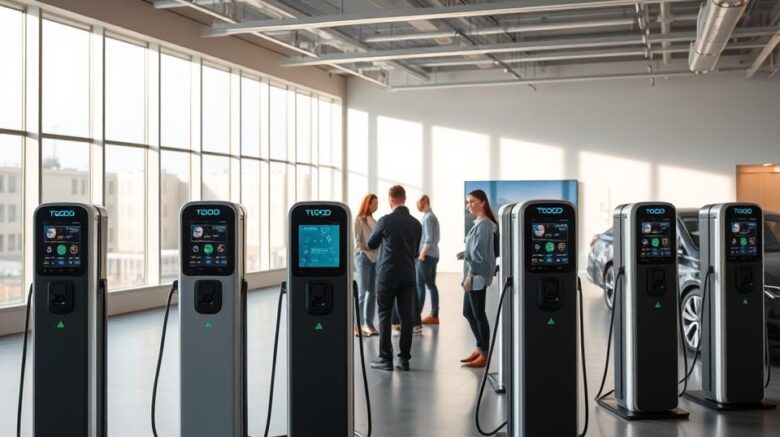Top EV Charging Cable Manufacturers for Your Electric Vehicle
The EV market is expanding rapidly, with the demand for trustworthy and high-performance charging solutions increasing sharply. As of now, leading companies have been at the vanguard of this change, providing high-quality charging infrastructure. Southwire, for instance, entered the market in 2014 and excels, boasting over 1000 five-star reviews and a 75-year legacy in electrical construction.
The upswing in electric vehicle adoption creates a requirement for durable, quick, and reliable Charger Manufacturers in China. Key suppliers are developing to meet these evolving needs, offering products that improve the overall charging experience.
Understanding the variations between various charging solutions is crucial for selecting wisely. High-grade charging infrastructure directly impacts vehicle performance and user experience.
Principal Learnings
- Leading brands provide premium cables that boost durability and security.
- The demand for efficient charging infrastructure is on the rise with the growth of the electric vehicle market.
- Top brands pioneer solutions for changing EV requirements.
- Quality charging cables directly impact charging efficiency and vehicle performance.
- Buying premium chargers pays off over time.

Why High-Quality EV Cables Matter
As more drivers choose EVs, the value of high-quality EV charging cables cannot be overstated. The efficiency, security, and dependability of electric vehicle charging systems rest on the quality of the charging cables used.
How EV Charging Tech Has Advanced
Charging tech for EVs has evolved rapidly, with a priority on speedy charge times and enhanced protections. Today’s EV charging cables are built for these requirements, featuring high-grade materials and advanced designs to minimize energy waste and maximize charging efficiency.
Quality’s Impact on EV Charging
Premium cables enhance both safety and functionality in EV systems. Durable features, such as all-weather performance and temperature tolerance, maintain performance in harsh conditions. Moreover, meeting standards and adherence to industry guidelines are crucial in ensuring that cables meet rigorous safety requirements.
| Key Features | Benefits |
|---|---|
| High-grade build quality | Minimized power loss during energy transfer |
| Enhanced durability features | All-weather reliability |
| Standards adherence | Certified safety |
| Serviceability | Repairable design for longevity |
Products from Aichie Tech Electronics pass The Cable Lab’s stringent tests. Choosing maintainable Portable EV Charger, owners save money long-term through repairs, lowering environmental impact.
Top EV Charging Cable Manufacturers in China
A surge of cable makers in China supports the EV boom. These companies are crucial in supporting the expanding electric vehicle (EV) market, providing high-quality automotive cables designed for different applications.
Wottz – Top EV Cable Maker from 2014
Wottz has established itself as a prominent player in the EV charging cable market since 2014. They offer a range of cables that meet the specific requirements of EV charging systems, from Mode 1, 2, 3, and fast-charging Mode 4 DC Charging.
Aichie Tech Electronics – 75 Years in Electrical Solutions
Aichie Tech Electronics leverages 75 years of electrical expertise in its EV cables. Their products are designed to meet the demands of both domestic and commercial EV charging infrastructure.
Other Notable Manufacturers in the Market
Specialists in Type 1/Type 2 connectors and environmental-resistant cables are emerging players. These include Type 1 & 2 connector experts, as well as companies developing cables with enhanced flexibility and resistance to environmental factors.
Understanding Different Types of EV Charging Cables
As electric vehicles become increasingly popular, understanding the various types of EV Charging Cable Manufacturers is crucial for optimal charging experiences. Different cables suit different charging needs. The diversity in EV charging infrastructure demands a closer look at the different cable types available.
Type 1 vs Type 2 Explained
SAE J1772 (Type 1) and Mennekes (Type 2) are the main global standards. Type 1, also known as SAE J1772, is predominantly used in North America, while Type 2, or Mennekes, is the European norm. The choice between these cables depends on the vehicle’s connector type and the charging station’s compatibility. Type 2 cables often support higher charging capacities, making them ideal for speed.
Level 2 & Fast DC Cables
Level 2 AC cables charge faster, up to 19.2 kW. DC Fast Charging cables, on the other hand, enable quick top-ups by on-site AC→DC conversion, allowing for much faster charging times. These cables are key for highway charging, letting EVs charge in minutes.
Portable vs Fixed Cables
Granny chargers plug into home outlets for emergency use. Tethered cables are attached permanently, providing a convenient but less flexible charging solution. The choice comes down to flexibility vs convenience.
When selecting an EV charging cable, factors such as cable length, charging speed, and compatibility with the vehicle are crucial. For instance, portable charging cables range from basic Level1 emergency chargers to more robust Level2 solutions. Vehicle-to-load (V2L) cables let EVs act as mobile power banks.
- Portable charging cables offer flexibility, with options ranging from basic to more robust Level2 solutions.
- Tethered cables are permanently attached to charging stations, limiting flexibility but eliminating the need for personal cables.
- Cable length is a critical consideration, with options ranging from 5-meter standard cables to 50-meter extended cables.
Key Features of High-Quality EV Charging Cables
Premium cables stand out for durability, safety, and performance. These features are crucial for maintaining the integrity of the charging process and safeguarding the vehicle and user.
All-Weather Durability
Durability and weather resistance are paramount in EV charging cables. Manufacturers like Wottz and Southwire craft their cables from recyclable materials that adhere to ROHS compliance, ensuring they perform in harsh climates. Their repairable builds support longevity and eco-reuse.
Flexibility and Ease of Use
Cables need to flex yet remain tough. High-quality EV charging cables are designed to be flexible, making them easier to handle and maneuver. This flexibility does not compromise their durability, as they are built to withstand regular use.
Certified Safety and Standards
Safety certifications and compliance with international standards are non-negotiable for reputable EV charging cable manufacturers. They ensure their products meet or exceed standards such as IEC62196 for connectors and UL2594 in North America. Rigorous third-party testing evaluates electrical safety, mechanical durability, and environmental resistance.
| Certification | Description | Region |
|---|---|---|
| IEC62196 | Connector safety standards | International |
| UL2594 | Standard for electric vehicle supply equipment | North America |
| ROHS | Restriction of hazardous substances | International |
Emphasizing these attributes yields cables that are safe, durable, and user-friendly.
Cutting-Edge EV Cable Innovations
New cable tech is transforming EV charging, with a focus on ultra-fast charging, improved signal integrity, and eco-friendly materials.
Liquid-Cooled Charging Cables for Ultra-Fast Charging
Cooling fluids enable higher charge rates, minimizing thermal throttling during high-power sessions.
Hyperboloid Contacts and Enhanced Signal Integrity
Hyperboloid contacts are being integrated into EV charging cables to enhance signal integrity, ensuring reliable and efficient data transfer during the charging process.
Sustainable and Recyclable Materials
Leading manufacturers are prioritizing sustainability in their cable designs, using recyclable materials and eco-friendly compounds that reduce environmental impact. For instance, companies like Aichie Tech Electronics and Wottz are embracing repairable designs and strict standards to foster reuse.
The industry’s shift towards sustainability includes the use of TPU jackets, avoidance of hazardous substances, and the development of take-back programs for end-of-life disassembly and material recovery.
Choosing the Perfect EV Cable
Choosing the right EV charging cable is crucial for efficient and safe charging. To make an informed decision, consider several key factors.
Connector Compatibility
Verify your car’s inlet and cable plug match. Your vehicle’s onboard charger capacity determines the maximum AC charging rate it can accept.
Picking the Right Cable Length
Choose a cable length that suits your charging needs. A longer cable provides more flexibility but may be heavier and less manageable.
Matching Power and Speed
Ensure cable amperage aligns with charger and car. Standard Level 2 home charging operates at 7.2 kW, but some vehicles support up to 19.2 kW with appropriate electrical service.
Mind these points to pick a cable that fits your EV lifestyle.
Final Thoughts on Premium EV Cables
With EV growth unabated, premium cables are essential. Choosing cables from Wottz or Aichie Tech Electronics provides long-term value and reliability. Their serviceable designs enable repairs over replacements to cut waste. This approach aligns with the core values of electric vehicle ownership by promoting sustainability.
Premium cables offer certification, future proofing, and reliability.
